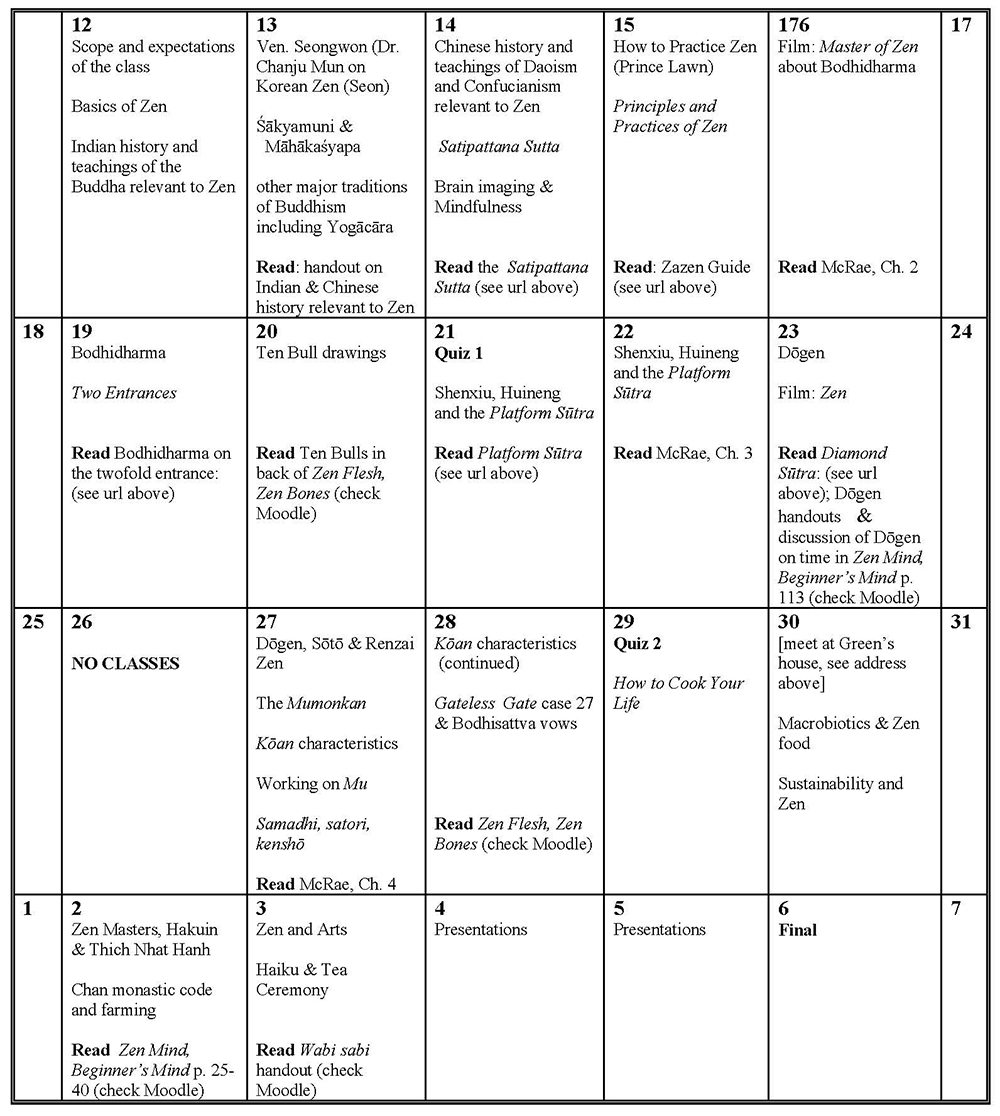 ZEN BUDDHISM
ZEN BUDDHISMThis class is a study of the philosophies and practices of Zen Buddhism as they appear in East Asia and America. Primary emphasis is placed on the idea of Zen as a transformative practice. The course uses classic Mahāyāna texts and the writings of Zen teachers. It also examines Zen through koans, zazen, engaged Buddhism, arts, and films. The class considers the relationship of Zen mind and Zen practice.
Upon successful completion of this course students will
More precisely, upon successful completion of this course students can expect to be able to: describe how and why political changes instituted by Empress Wu of China and the Japanese Kamakura bakufu promoted the growth of Zen in their respective countries, explain how Zen contrasts with and compliments Tantric Buddhism and Pure Land soteriology, describe the life and works of Bodhidharma, Huineng, Shenxiu, and Dōgen, explain the Buddhist doctrines of dependent origination, no-self, satori and emptiness in terms of Zen discuss claims by film directors, artists, farmers, and politicians about how they are using Zen in their respective fields, discuss interpretations of psychologists who conduct brain imagining analysis of meditators.
McRae, John R. Seeing through Zen: Encounter, Transformation, and Genealogy in Chinese Chan. University of California Press, 2004. ISBN 0520237986
Satipattana Sutta at: http://www.accesstoinsight.org/tipitaka/mn/mn.010.than.html
Zazen Guide at: http://www.zenguide.com/practice/zazen_guide.pdf
Bodhidharma’s Two Entrances at: http://www.sacred-texts.com/bud/mzb/mzb04.htm
Diamond Sūtra at: http://lapislazulitexts.com/vajracchedika_prajnaparamita_sutra.html
Platform Sūtra at: http://www.bdkamerica.org/digital/dBET_T2008_PlatformSutra_2000.pdf
Teaching Zen’s Ten Oxherding Pictures through Leonard Cohen’s “Ballad of the Absent Mare”, Ronald S. Green https://www.asianetworkexchange.org/articles/10.16995/ane.131/
Zen Flesh, Zen Bones compiled and translated by Paul Reps et al. Publisher: Tuttle. ISBN: 0804831866 (check Moodle for passages)
Zen Mind, Beginner’s Mind by Shunryu Suzuki. Publisher: Weatherhill. ISBN: 0834800799 (check Moodle for passages)
1. Student attendance, preparation, and participation is worth 10% of the grade for the term. Students missing five classes (in any portion equaling five classes and regardless of the reason for missing the classes) will receive a final grade of “F” for the term. Students missing four classes will have one point deducted from the final grade; those missing three classes will have three points deducted from the final grade; those missing two classes will have two points deducted from the final grade; those missing one class will have one point deducted from the final grade. Preparation means having read the assignment for the day.
2. There will be two in-class quizzes, each worth 22.5% of the final grade.
3. There will be a non-cumulative Final Exam worth 22.5% of the final grade.
4. Students are required to give a short (10-15 minute) in-class presentation elaborating on a topic directly related to Zen. The presentation is worth 22.5% of the final grade. The topic must be approved by the instructor, researched, prepared and presented by the student. Possible topics include the life of a historical figure, Zen cooking, zazen, haiku (or a specific Zen poet), Thich Nhat Hanh’s writings, Punk Zen, Zen filmmaking.
Based on the above, students will earn a letter grade for the term according to the following system:
